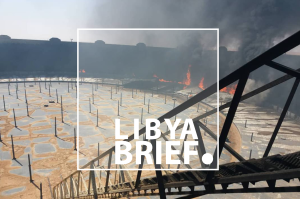Asset Publisher
Libya Brief
Facts and analysis on a country in transition
Asset Publisher
The short Libya Briefs offer facts and analyses on recent developments in and around Libya. They present the results of activities done by the Regional Program with opinions and analysis from experts within the foundation’s network about key issues concerning security, governance, and conflict resolution in the Libyan theatre.
The Role of The EU in The Libyan Conflict Since 2011
Libya is still in an open transformation process, more than a decade after the fall of Ghaddafi. Currently, two governments are once again competing for power in the Mediterranean country in Europe's immediate southern neighborhood. While Russia, Turkey and the Gulf states have gained increasing influence in Libya in recent years, the question of the EU's role and influence in the North African state often remains open. The latest article in our Libya Brief series looks at the EU's role in Libya since 2011 and argues for a more visible EU in managing the Libyan crisis. Read more here.
Libya's Constitutional Quagmire
While significant milestones have recently been reached in the Libyan political dialogue held under the United Nations’ auspices since November 2020, including the establishment of a new government of national unity, the holding of general elections set for December 2021 has now become the main focus of attention and a top priority of both the Libyan stakeholders and their international partners. However, persistent disagreement on the constitutional basis needed to hold these elections, and in particular on whether to rely on the draft constitution issued by Libya’s constituent assembly in 2017 or on an alternative document, may undermine the progress achieved so far and hamper the completion of the agreed roadmap. This paper will attempt to review the main obstacles that have prevented the adoption of a permanent constitution in Libya to date, and assess whether the various constitutional options currently under discussion could provide a relevant basis for Libya’s next elections. Read more here
Libya’s Political Culture Wars
The announcement of UN-brokered permanent ceasefire in Geneva and political talks in Tunisia has given renewed optimism that Libya’s elusive peace attempts are yet again within close grasp. Despite several high-profile international attempts in Moscow and Berlin (January, 2020) to broker a ceasefire and restart the political process, the battle in Libya not only resumed, but intensified, culminating in all-out war before reaching a stalemate in June, 2020. The conflict was sparked on April 4th, 2019, when self-styled leader of the Libyan Arab Armed Forces (LAAF) Khalifa Haftar launched an attack on Tripoli to overthrow the internationally recognised UN-backed Government of National Accord (GNA). The role of regional and international powers in support of both factions during the war has further entrenched positions, and added to the intractability of the conflict. Read more here...
Libya Conference: A Success for German Diplomacy
The Libya Conference in Berlin is a success for German diplomacy. For five months now the German government has been working behind the scenes on the so-called Berlin process for Libya, which Chancellor Merkel announced in September and has been pushing ahead intensively ever since. The conference in Berlin was preceded by several meetings of senior officials from the participating states and regional organizations. All foreign powers with a hand in the Libyan conflict were able to come together and pledged to comply with the UN arms embargo in the future and not to supply any more Libyan conflict parties with fighters or weapons. The success of the conference is a clear credit to the Chancellor. This publication is available in German only. Read more here...
Peace by Piece: Solving the Libyan Puzzle through Municipalities
Municipal councils and other local community actors are crucial for solving Libya’s current crisis. While the implementation of decentralization efforts is stalled at present due to the ongoing conflict, the escalation of political and military tensions at the national level has given an even greater importance to local bodies and initiatives. In times of war and political uncertainty, and despite various ideological divisions within members of municipal councils, local government authorities can be key actors in reconciliation and service provision for the population. Read more...
Libya: Haftar in the Tripoli Stalemate
While fighting units of the self-proclaimed field marshal and de facto ruler of Eastern Libya, Khalifa Haftar, are standing outside the gates of the Libyan capital Tripoli, the militias in the west of the country, under the National Unity Government (GNA), have proclaimed Operation Volcano of Wrath to defend the capital. Haftar and his "Libyan National Army" (LNA) want to take power in Tripoli and thus in the whole of Libya. For this he must put everything on one card. This publication is available in German only. Read more...
The Fight Over Libya's Oil
Libya's oil crescent has been shaken by clashes between militias and the forces of Khalifa Haftar. This is not the first time that the Gulf of Sidra becomes the scene of Libyan power struggles. The recent developments around the two oil terminals Ras Lanuf and El-Sidr showcase the fragmented political and economic conditions in Libya, which are exacerbated by the parallel structures in West and East. The publication is available only in German. Read more...
An Assessment of the International Conference on Libya
Following the initiative of French President Emmanuel Macron, an international conference on Libya took place in Paris on 29 May 2018, in an effort to advance the political unification and reconciliation process in the country. The conference was held under the patronage of the UN Special Envoy to Libya. Macron had previously brought together two Libyan key players in France. The French initiative is widely understood as a clear message that France wants to take the lead in the stabilization of Libya. The publication is available only in German. Read more...
Oil, Banks, and Governance: Economic Realities in a Divided Libya
In Libya, the economy is obstructed by continuing violent conflict and political uncertainty. Inflation accelerated, the black market is thriving and the future challenges are manifold. Many efforts – including specific policies and economic orientations - have been developed by Libya’s political authorities, in the East and in the West, to try and limit the effects of economic problems on the society. However, results remain limited so far. This Libya Brief provides an analysis of the Libyan economy and provides constructive recommendations. Read more...
The Caliphate is Dead, Long Live the Caliphate
After the collapse of the so-called Islamic State in the coastal city of Sirte in December 2016, this brief analyzes what impact the fall of the Libyan offshoot of the "caliphate" will have on the stability of the region and the future of jihadism in North Africa. The publication is only available in German. Read more...
The new UN Action Plan for Libya: An End to the Crisis?
The new Special Representative of the UN Secretary-General on Libya SRSG Dr. Ghassan Salamé presented a new three-stage UN Action Plan to unify and pacify the war-torn country. This short Libya Brief outlines the UN initiative and evaluates its chances of success. The publication is in German. Read more...
Security and Stability in Libya: The Way Forward
Due to the pressing issues and challenges brought by Libya’s instability and its consequences on both the country and its neighborhood, the KAS Regional Program South Mediterranean and the Madrid-based think tank Stractegia organized an expert workshop dedicated to the security situation in Libya and the way and means that are required to overcome obstacles to reconciliation and peace. Read more...
State legitimacy and local governance in Libya
Instability, insecurity, war and political divisions have been prevailing in Libya for almost six years. In this situation, Libya’s successive governments have failed to address the population’s basic needs. As a result, many Libyans turned their heads towards local governments, adding to internal divisions. To contribute to this understanding, the KAS Regional Program South Mediterranean in cooperation with the Madrid-based think tank Stractegia organized a conference on state legitimacy and local governance in Libya in the current peace process. Read more...




